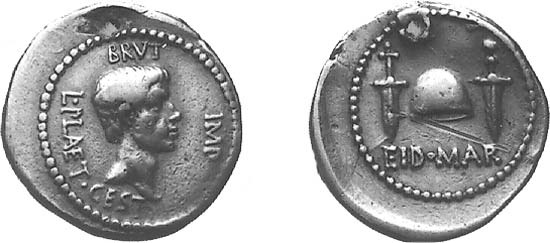Brutus, Marcus Junius
Roman politician
also called Quintus Caepio Brutus
born probably 85 BC
died 42 BC, near Philippi, Macedonia 【now northwestern Greece】
 Roman politician, one of the leaders in the conspiracy that assassinated Julius Caesar (Caesar, Julius) in 44 BC. Brutus was the son of Marcus Junius Brutus (who was treacherously killed by Pompey the Great in 77) and Servilia (who later became Caesar's lover). After his adoption by an uncle, Quintus Servilius Caepio, he was commonly called Quintus Caepio Brutus.
Roman politician, one of the leaders in the conspiracy that assassinated Julius Caesar (Caesar, Julius) in 44 BC. Brutus was the son of Marcus Junius Brutus (who was treacherously killed by Pompey the Great in 77) and Servilia (who later became Caesar's lover). After his adoption by an uncle, Quintus Servilius Caepio, he was commonly called Quintus Caepio Brutus.Brutus was brought up by another uncle, Cato the Younger (Cato, Marcus Porcius), who imbued him with the principles of Stoicism. In the 50s he opposed Pompey's increasing power, but, upon Caesar's invasion of Italy in 49, Brutus was reconciled with Pompey and served under him in Greece. When Caesar defeated Pompey at the battle of Pharsalus in 48, Brutus was captured. He was soon pardoned by Caesar, probably as a result of his mother's influence. Brutus became a member of the senior priesthood of the pontifices (pontifex) and from 47 to 45 governed Cisalpine Gaul (now northern Italy) for Caesar. Caesar appointed him city praetor (a high-ranking magistrate) in 44 with Gaius Cassius Longinus (Cassius Longinus, Gaius), and he named Brutus and Cassius in advance as consuls for 41. Brutus married Cato's daughter Porcia after Cato's death in 46.
 Long optimistic about Caesar's plans, Brutus was shocked when, early in 44, Caesar made himself perpetual dictator and was deified. Always conscious of his descent from Lucius Junius Brutus, who was said to have driven the Etruscan kings from Rome, Brutus joined Cassius and other leading senators in the plot that led to the assassination of Caesar on March 15, 44 BC. Driven from Rome by popular outrage, Brutus and Cassius stayed in Italy until Mark Antony (Antony, Mark) forced them to leave. They went to Greece and then were assigned provinces in the East by the Senate. They gradually seized all of the Roman East, including its armies and treasuries. Having squeezed all the money he could out of Asia, Brutus turned the wealth into Roman gold and silver coins, some (following Caesar's example) with his own portrait on them. In late 42 he and Cassius met Mark Antony and Octavian (later the emperor Augustus) in two battles at Philippi. Cassius killed himself after being defeated in the first, and Brutus did likewise after being defeated in the second. Mark Antony gave him an honourable burial.
Long optimistic about Caesar's plans, Brutus was shocked when, early in 44, Caesar made himself perpetual dictator and was deified. Always conscious of his descent from Lucius Junius Brutus, who was said to have driven the Etruscan kings from Rome, Brutus joined Cassius and other leading senators in the plot that led to the assassination of Caesar on March 15, 44 BC. Driven from Rome by popular outrage, Brutus and Cassius stayed in Italy until Mark Antony (Antony, Mark) forced them to leave. They went to Greece and then were assigned provinces in the East by the Senate. They gradually seized all of the Roman East, including its armies and treasuries. Having squeezed all the money he could out of Asia, Brutus turned the wealth into Roman gold and silver coins, some (following Caesar's example) with his own portrait on them. In late 42 he and Cassius met Mark Antony and Octavian (later the emperor Augustus) in two battles at Philippi. Cassius killed himself after being defeated in the first, and Brutus did likewise after being defeated in the second. Mark Antony gave him an honourable burial.Contrary to the principles he espoused as a Stoic, Brutus was personally arrogant, and he was grasping and cruel in his dealings with those he considered his inferiors, including provincials and the kings of client states. He was admired by Cicero (Cicero, Marcus Tullius) and other Roman aristocrats, and after his death he became a symbol of resistance to tyranny. Shakespeare found in the Parallel Lives of Plutarch the basis for his sympathetic portrayal of the character Brutus in the play Julius Caesar.
Brutus was an eminent orator of the Attic school of public speaking— i.e., he adhered to rhetorical principles based on notions of naturalness in reaction to trends toward excessive displays of emotion (of the Asiatic school)—and he wrote many literary works, all lost. Some of his letters survive among Cicero's correspondence.
- Borden, Sir Robert
- Bordentown
- Border, Allan Robert
- border ballad
- border collie
- border terrier
- Bordes, Charles
- Bordet, Jules
- Bordighera
- Bordone, Paris
- Bordoni, Faustina
- Borduas, Paul-Émile
- bore
- boreal forest
- Boreas
- Borel, Jacques
- Borelli, Giovanni Alfonso
- Borel, Petrus
- Borel, Émile
- Borenius, Tancred
- borer beetle
- Borg, Arne
- Borg, Björn
- Borgen, Johan
- Borger